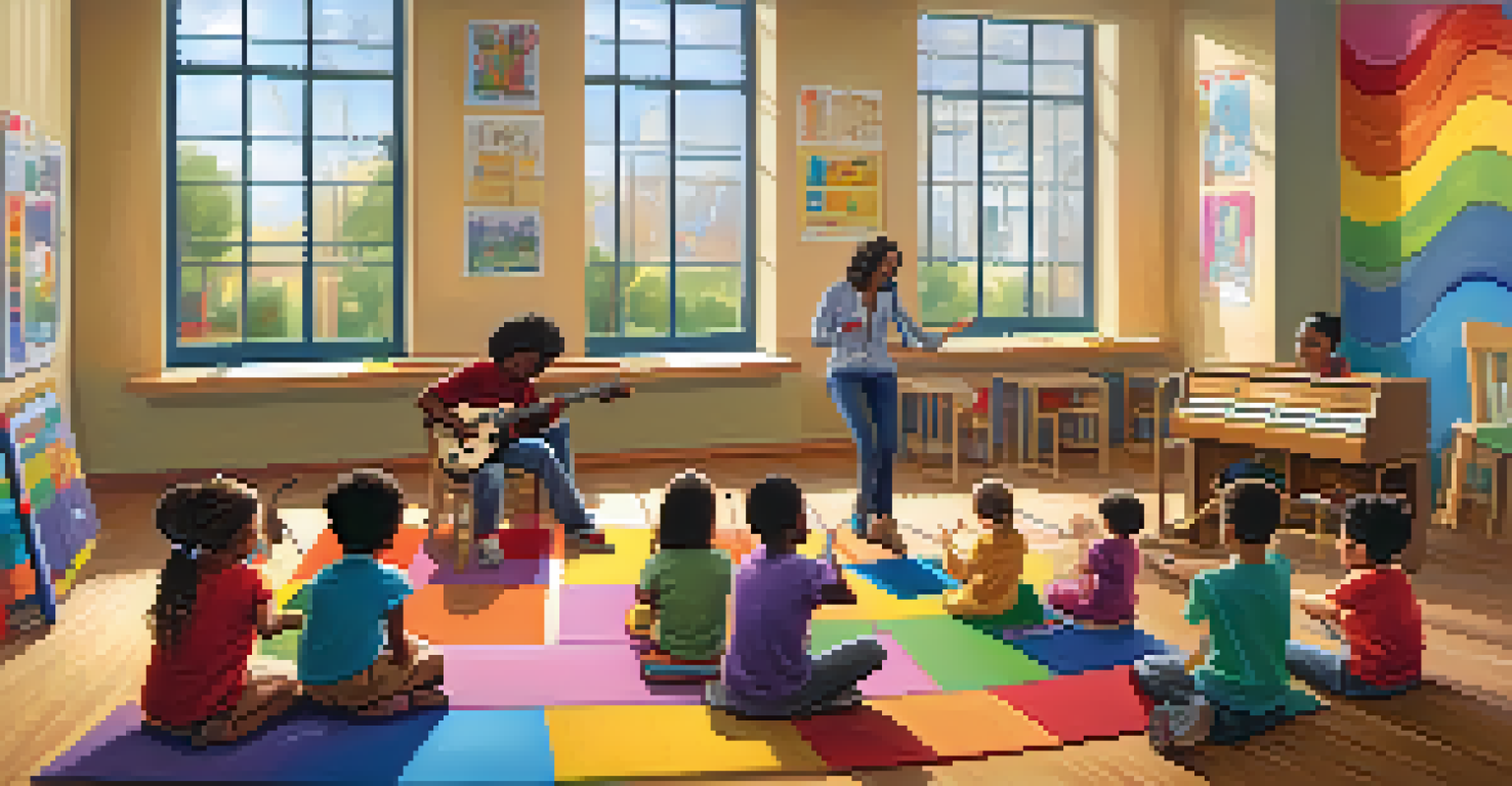The Impact of Music on Brain Development in Children

Understanding Brain Development in Early Childhood
The early years of a child's life are critical for brain development. During this time, a child's brain undergoes rapid growth and forms essential neural connections. Experiences during these formative years can significantly shape cognitive, emotional, and social skills. Understanding this phase is crucial for parents and educators who want to foster a supportive learning environment.
Music can change the world because it can change people.
Scientific research shows that the brain is especially adaptable in young children, which means that various stimuli can influence development. Music, as a rich auditory experience, plays a unique role in this process. It can enhance brain functions such as memory, attention, and language skills, making it a powerful tool in childhood education.
By introducing music early on, caregivers can create opportunities for children to engage in a multisensory experience. This engagement not only nurtures creativity but also encourages critical thinking and problem-solving skills. Thus, understanding the connection between music and brain development can guide effective parenting and teaching strategies.
The Role of Music in Cognitive Development
Cognitive development refers to how children think, learn, and understand the world around them. Engaging with music can significantly boost these cognitive abilities. For example, learning to play an instrument involves reading music, which enhances spatial-temporal skills—important for subjects like math and science.

Moreover, music helps children develop better memory and attention spans. When children participate in musical activities, such as singing or clapping along, they practice focusing and retaining information. This exercise can translate into improved academic performance and better retention of knowledge in other areas.
Music Enhances Cognitive Skills
Engaging with music boosts cognitive abilities, improving skills like memory, attention, and language development.
Additionally, music can enhance language skills by exposing children to new vocabulary and rhythms. Songs often include repetitive patterns and rhymes that make it easier for children to learn pronunciation and grammar. Therefore, integrating music into daily routines can create a rich learning environment that supports cognitive growth.
Emotional Benefits of Music in Childhood
Music is not just about notes and rhythms; it also plays a vital role in emotional development. Children often express their feelings through music, whether by playing an instrument or singing along to their favorite songs. This expression can help them process emotions, leading to better emotional regulation as they grow.
The future belongs to those who believe in the beauty of their dreams.
Listening to music has been shown to trigger the release of dopamine, the brain's feel-good chemical. This response can elevate mood and reduce feelings of anxiety or stress. For children, especially those who may struggle with expressing their emotions, music can serve as a comforting outlet.
Furthermore, group music activities, like choir or band, foster social connections. These experiences help children develop empathy and teamwork skills, as they learn to collaborate and appreciate others' contributions. Thus, music serves as both a personal and communal tool for emotional and social development.
Music and Motor Skills Development
Engaging with music can significantly enhance a child's motor skills. Activities like dancing or playing instruments require coordination, timing, and rhythm, all of which help develop fine and gross motor skills. For instance, drumming encourages hand-eye coordination while dancing improves overall body movement.
Moreover, these motor skills are essential for everyday tasks, such as writing or sports. When children participate in musical activities that require physical movement, they practice coordination and balance, which can boost their confidence in physical abilities. This newfound confidence often spills over into other aspects of their lives.
Emotional Growth Through Music
Music serves as a powerful outlet for emotional expression, helping children regulate their feelings and build social connections.
Incorporating music into playtime can make learning motor skills fun and engaging. Simple activities like clapping, tapping, or moving to music can motivate children to be active, making it easier for them to develop these crucial skills naturally. Thus, music can be a powerful catalyst for improving motor development.
Music Education and Academic Success
Research consistently shows a positive correlation between music education and academic success. Children who receive music training often exhibit higher test scores and better grades. This phenomenon can be attributed to the cognitive benefits gained through musical training, which enhances overall learning capabilities.
For instance, students involved in music programs tend to excel in math and reading due to the skills they develop in music, such as pattern recognition and auditory processing. These skills are transferable and can significantly impact a child's academic performance in various subjects.
Moreover, music education fosters discipline and perseverance. Learning an instrument requires practice and dedication, qualities that are essential for academic achievement. As children navigate the challenges of mastering music, they also learn valuable life skills that contribute to their overall success in and out of the classroom.
Cultural Awareness and Music
Music is a universal language that transcends boundaries and connects people from diverse backgrounds. Introducing children to various musical genres can foster cultural awareness and appreciation. This exposure can help them understand and celebrate differences, promoting inclusivity and empathy.
Engaging with different types of music also allows children to explore the world without leaving their homes. For example, listening to traditional music from various cultures can spark curiosity and discussions about customs, histories, and values. This exploration can broaden their horizons and encourage a more profound understanding of global diversity.
Parental Involvement is Key
Active participation from parents in music activities fosters a child's interest and nurtures a lifelong love for music.
Furthermore, participating in multicultural music activities can provide children with a sense of belonging. It helps create a community where they feel connected to others, regardless of their backgrounds. This sense of unity is crucial in fostering a supportive and inclusive environment for children.
Parental Involvement in Music Education
Parental involvement plays a crucial role in a child's musical journey. When parents actively participate in music-related activities, such as attending concerts or singing at home, they demonstrate the value of music in their lives. This encouragement helps foster a positive attitude toward music education.
Additionally, parents can support their children's musical endeavors by providing access to instruments or enrolling them in music classes. This investment not only nurtures their child's interest in music but also opens doors to various opportunities for growth and development.

Moreover, engaging in music as a family can strengthen bonds and create lasting memories. Whether it's a family karaoke night or a dance party in the living room, these experiences foster connection while enriching a child's musical journey. In essence, parental involvement is a vital ingredient in nurturing a lifelong love for music.